It’s no secret that I’m an egg fanatic (check my logo). Hard-boiled eggs are inexpensive, easy to cook, and so extremely versatile. In fact, my favorite budget meal hack has always been to just “put an egg on it.” So follow this easy, fool-proof tutorial on how to make hard-boiled eggs so you can keep a stash in the fridge and add an egg whenever you need to make a meal or snack more hearty. And don’t worry, we’ve included plenty of tips for peeling hard-boiled eggs and a long list of recipes that use hard-boiled eggs!
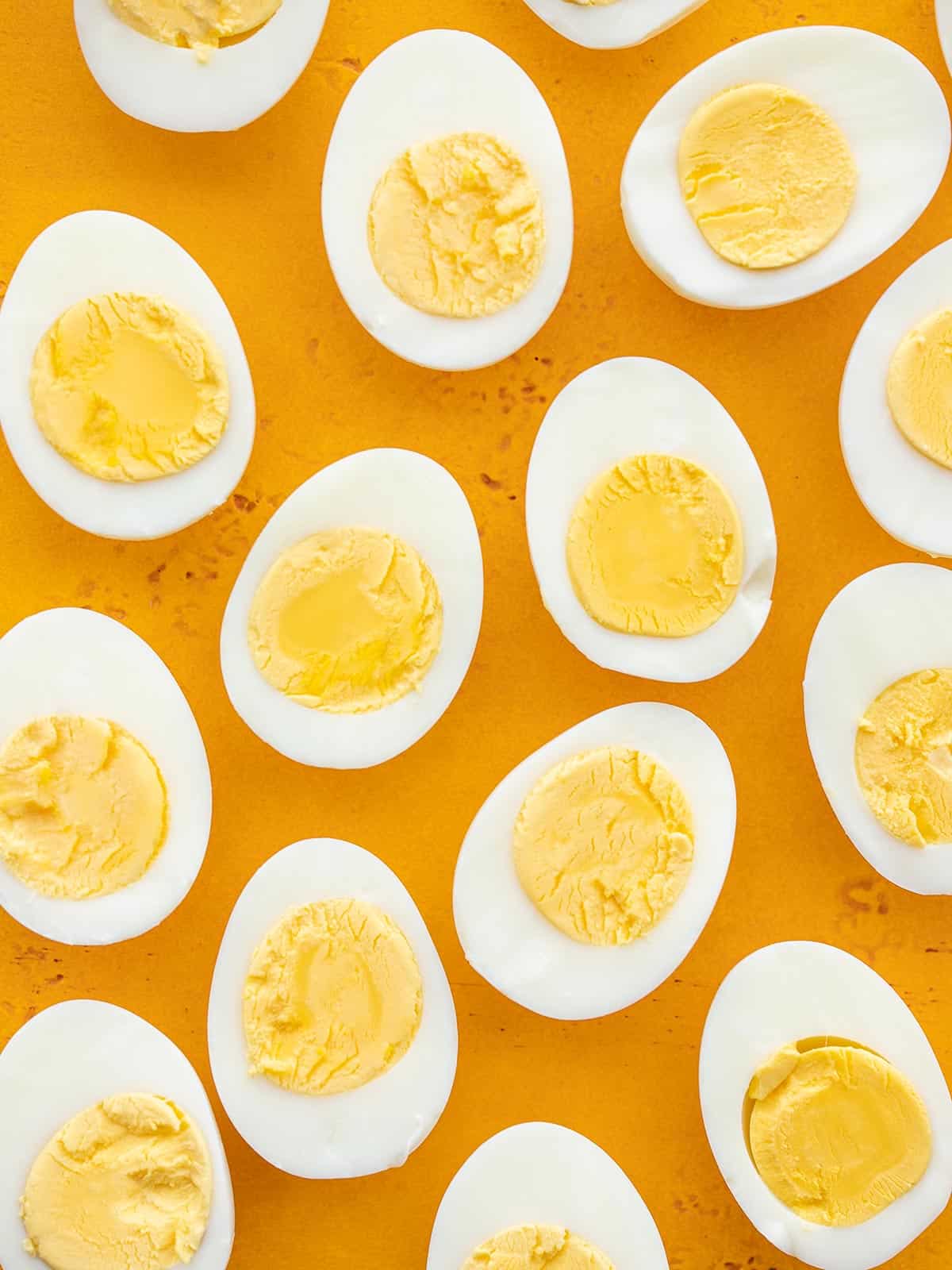
This post contains some affiliate links, which means that we make a small commission off items you purchase at no additional cost to you.
Let’s just get right to the nitty-gritty of what everyone wants to know…
How to Hard Boil Eggs
There are several ways to make hard-boiled eggs but I like the hot water bath method the best because it doesn’t require a lot of attention and it’s pretty forgiving if you can’t tend to the eggs right when your timer goes off. Here are the basic steps for hard-boiling eggs:
- Add cold eggs to a pot and cover with water: Place cold, large eggs straight from the refrigerator into a saucepot in a single layer. Add enough water to cover the eggs by one inch.
- Bring to a boil: Place a lid on the pot and bring the water up to a boil over high heat.
- Turn off the heat: When the water reaches a full rolling boil, turn off the heat and leave the pot on the burner (lid still on). Let the eggs sit in the hot water for about 12 minutes. The water will slowly cool as they sit, which helps give you some flexibility before the eggs overcook (green-tinged yolk=over cooked egg).
- Cool the eggs: After 12 minutes, transfer the hard-boiled eggs to a bowl of ice water for about 5 minutes.
- Peel and enjoy!
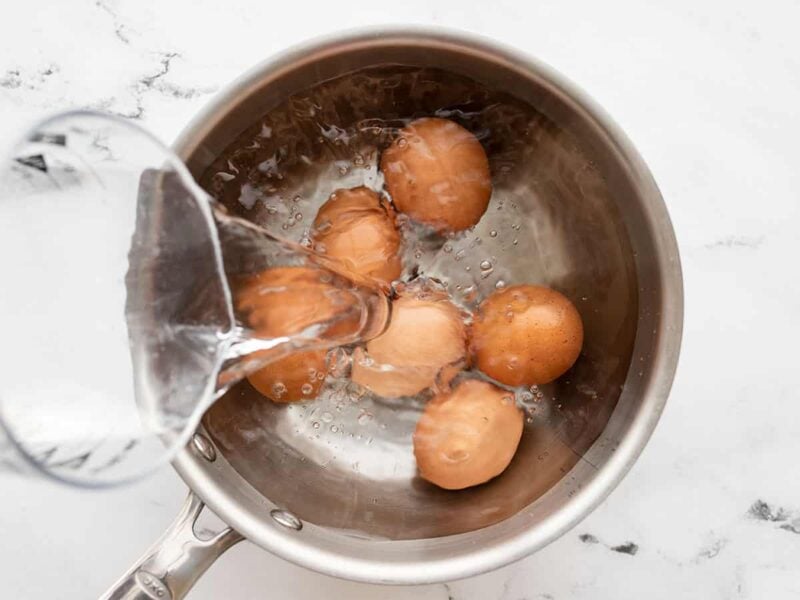
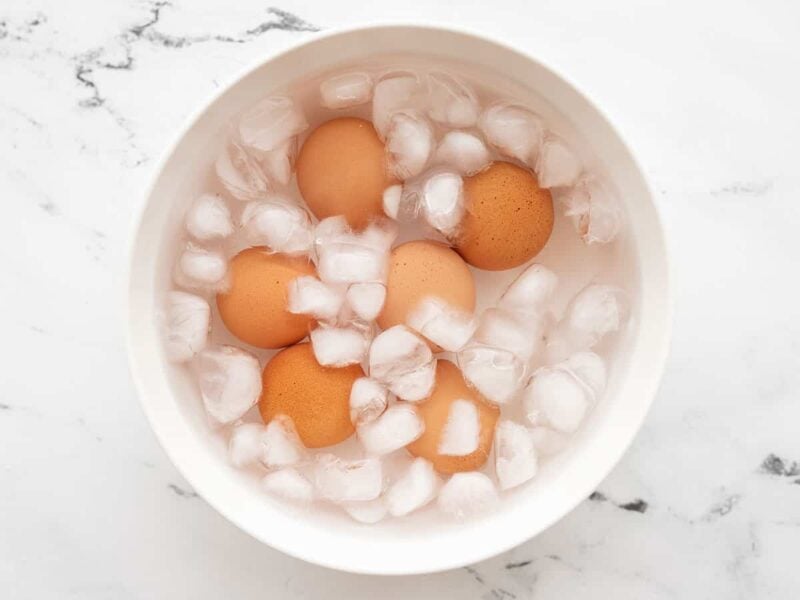
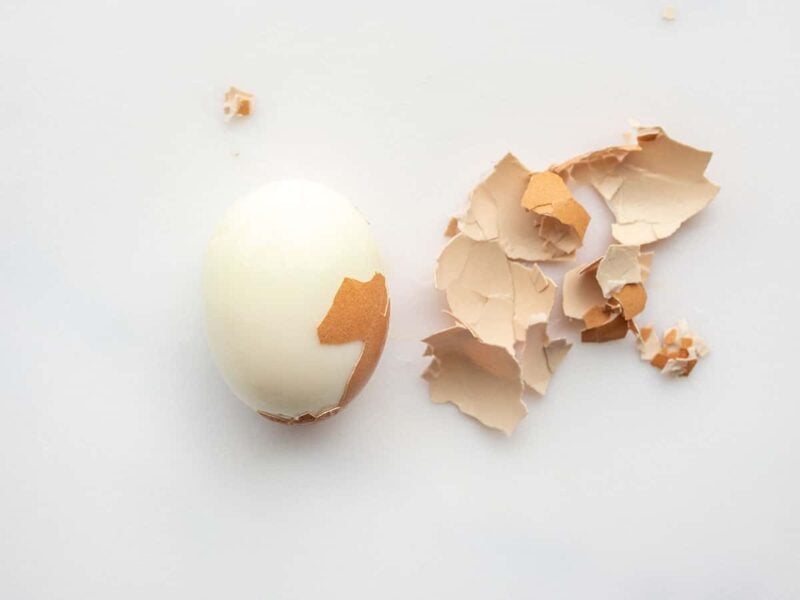
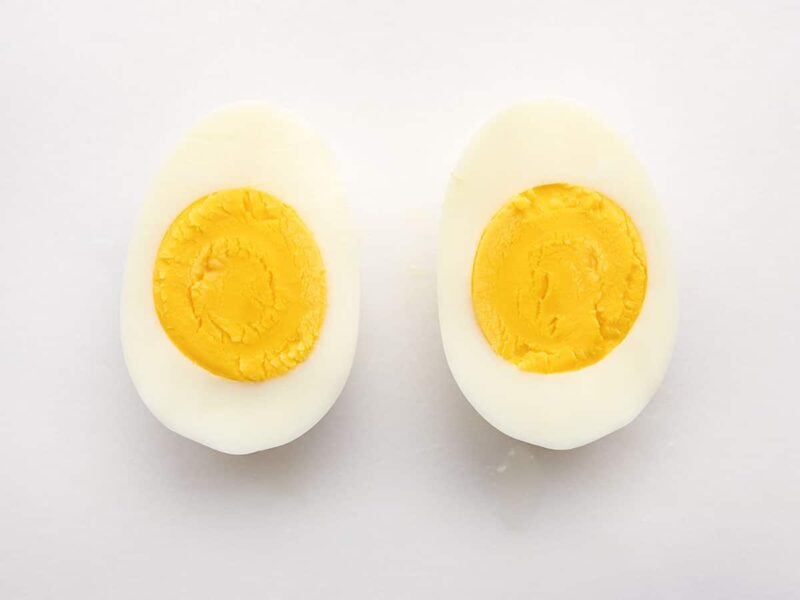
How Long to Hard-Boil Eggs
The easy answer: boil large eggs for about 12 minutes to make hard-boiled eggs.
The long answer: The amount of time needed to hard boil an egg can vary depending on several factors including:
- The size of the egg
- The type of cookware and stovetop used
- The starting temperature of the egg
- The boiling method used (cold start, hot start, steaming)
- Your altitude
You can start with our time guide below, but you may need to experiment a little to find the exact time needed to make perfect hard-boiled eggs using your equipment, your eggs, and your altitude.
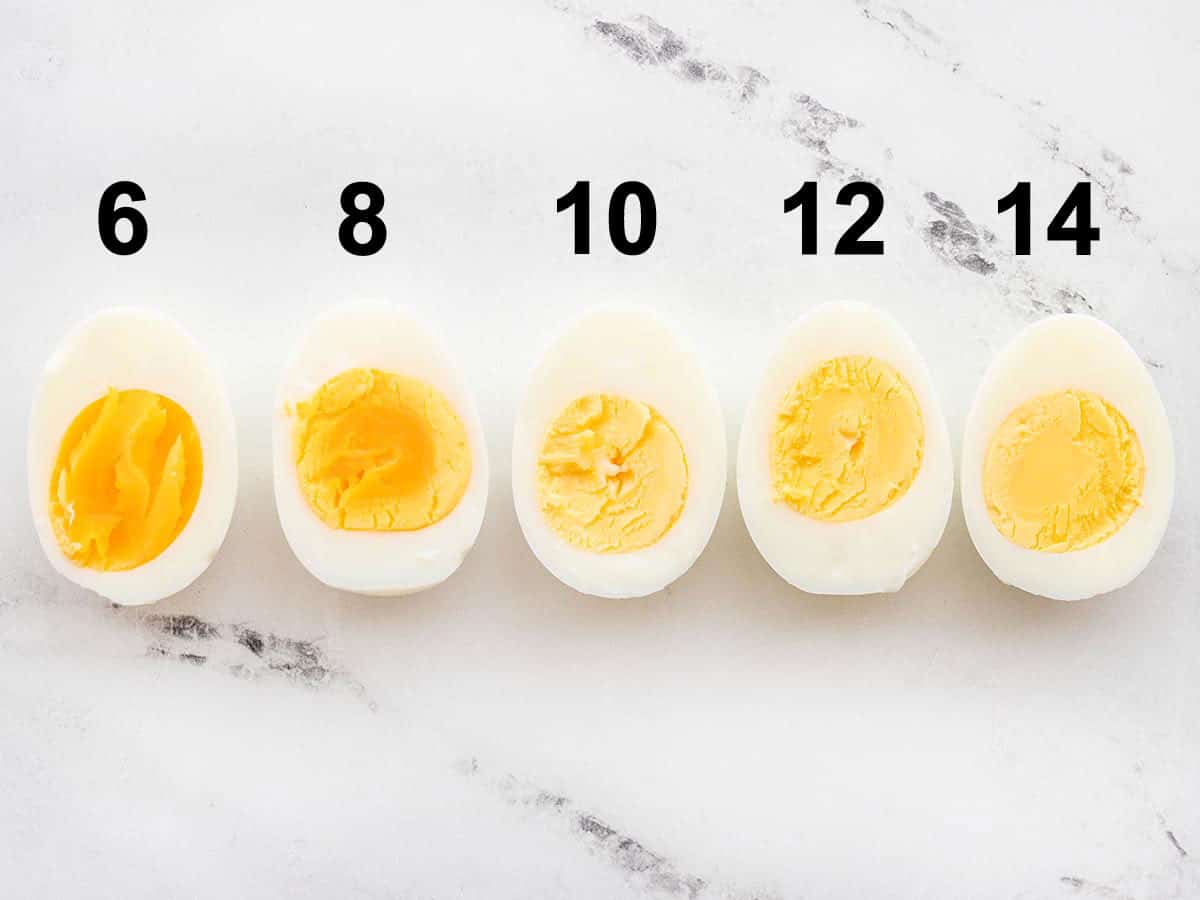
The image above shows results after boiling eggs for 6, 8, 10, 12, and 14 minutes.
- 6 minutes: nice jammy yolk
- 8 minutes: yolk is half set, half jammy
- 10 minutes: mostly set with a bit of wetness in the center of the yolk
- 12 minutes: completely solid yolk
- 14 minutes: solid yolk, not yet overcooked to the point of a green yolk
Hard Boil Eggs Using Steam
I also like to steam my eggs, as seen in my tutorial for 6-minute soft boiled eggs. This method is super fast because you only use about an inch of water, which comes to a boil very quickly. To make hard boiled eggs using the steaming method, simply let them steam for about 10-12 minutes. I also find that steamed eggs tend to peel very easily. See the steaming tutorial here.
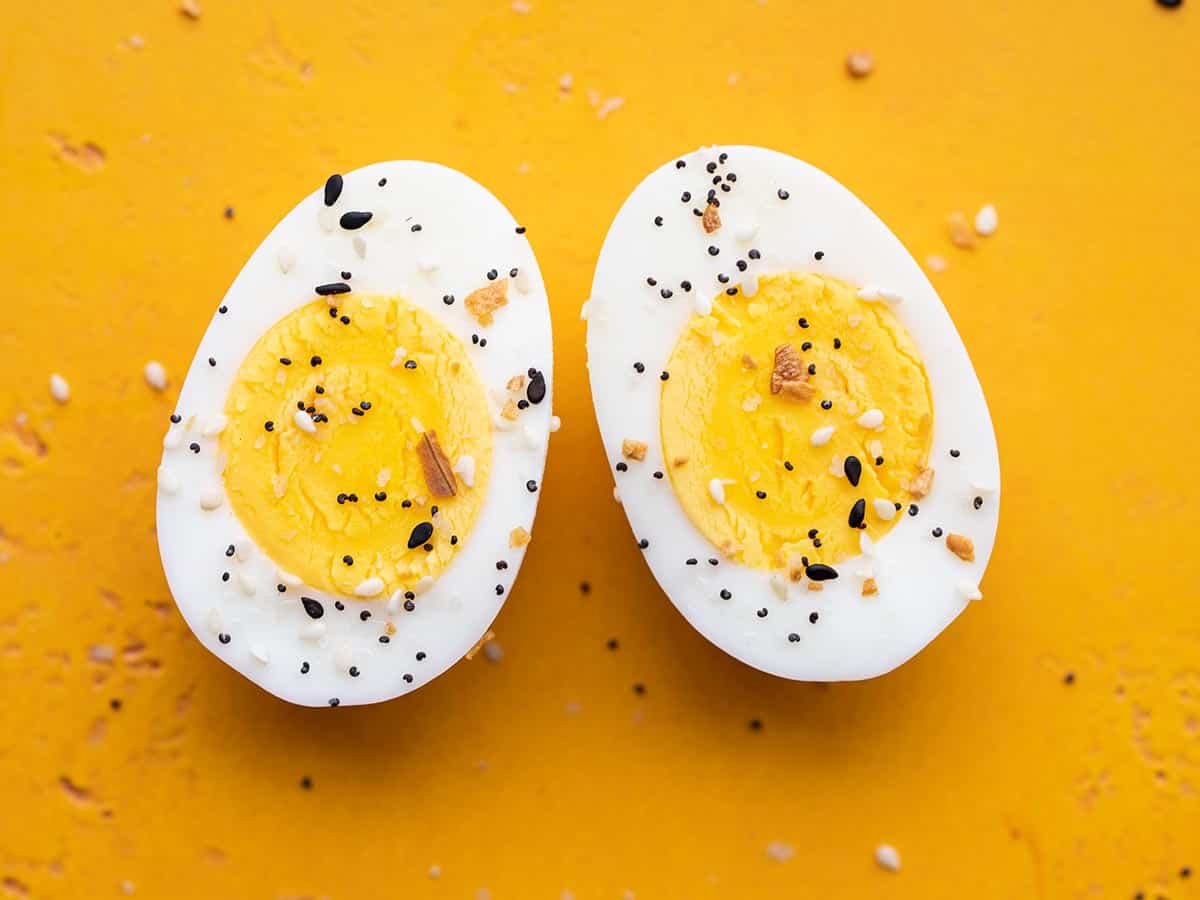
How Long Are Hard-Boiled Eggs Good?
A hard-boiled egg will stay good for about a week when refrigerated in its shell. A peeled hard-boiled egg should be eaten within two days.
Tips for Peeling Hard-Boiled Eggs
There’s nothing more frustrating than a hard-boiled egg that is difficult to peel, so here are some tricks that may help make your hard-boiled eggs easier to peel:
- Old eggs peel easier than fresh eggs
- Add cold eggs to boiling water instead of bringing them to a boil together (this is the method used in our steaming method listed above)
- Tap the egg on a solid surface, then gently roll to crack the shell on all sides before peeling rather than just crushing one part of the shell
- Peel eggs under running water (the water flow helps separate the white from the peel)
- After removing part of the shell, slide a spoon between the shell and the egg white to separate them
- Place the eggs in a covered container and gently shake to crack the shells until they fall off
- Add baking soda to the water (about ½ tsp per pot)
Have you had success with any of these methods? Share which one works best for you in the comments below.
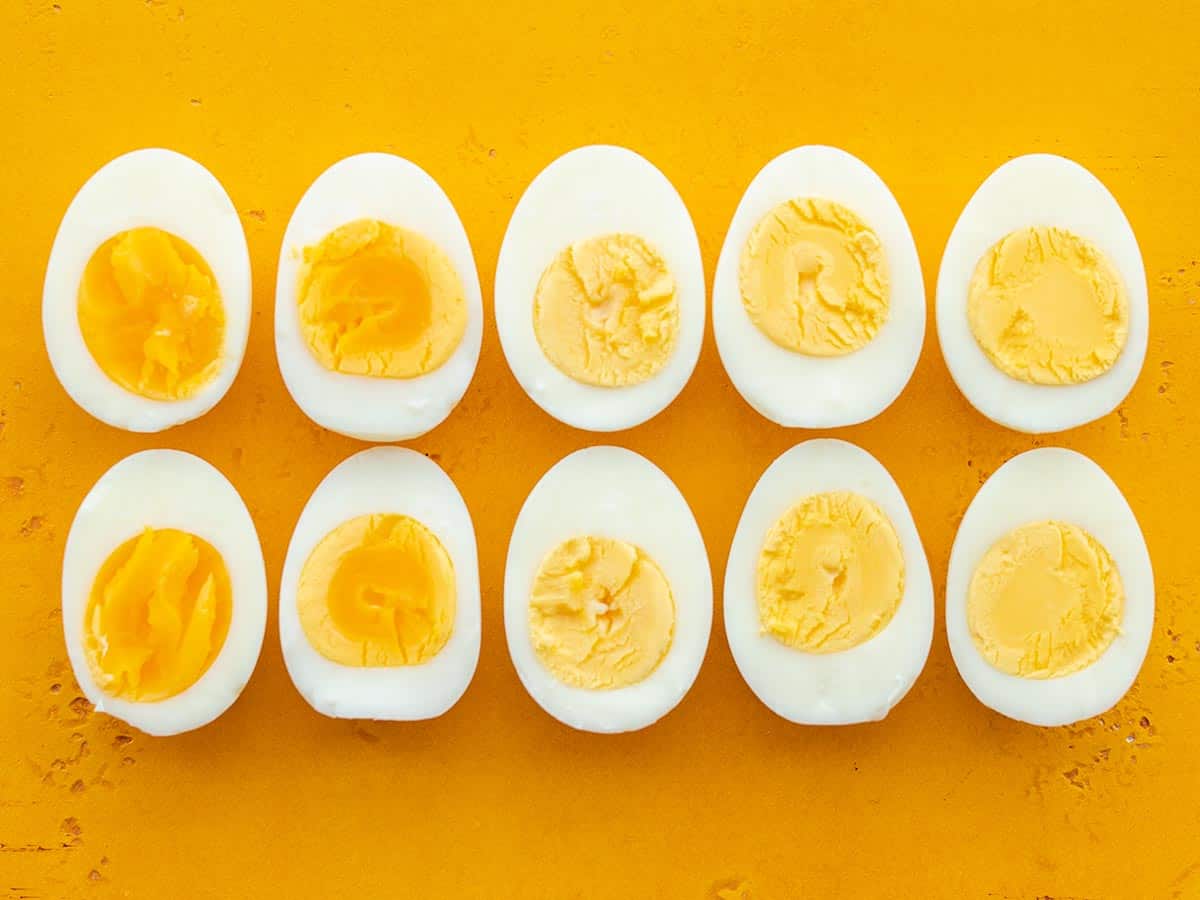
Recipes Using Hard-Boiled Eggs
I love adding hard-boiled eggs to just about everything, but if you need a little inspiration for how to use your hard-boiled eggs, here are a few hard-boiled egg recipe ideas:
- Deviled Eggs (or Sriracha Deviled Eggs)
- Egg Salad
- Meal prep lunch box
- Add them to a breakfast bowl
- Add to Salads
- They make an interesting addition to guacamole or avocado dip
- Use in potato salad
- Add to a bowl of ramen
- Chop and stir into tuna salad
- Slice and add to avocado toast (I like to top with everything bagel seasoning and sriracha)
- Slice and add to a veggie sandwich
- Add to a bowl of savory oatmeal
What Causes Green Yolks?
Have you ever peeled a hard-boiled egg only to find that the yolk has turned green? Don’t worry, it doesn’t mean the egg is rotten! Egg yolks turn green when overcooked due to a chemical reaction that occurs between the sulfur in the egg white and the iron in the egg yolk.
To prevent green yolks, make sure to not boil the egg longer than needed and transfer the eggs to an ice bath directly after cooking to prevent carryover cooking.
Hard Boiled Eggs
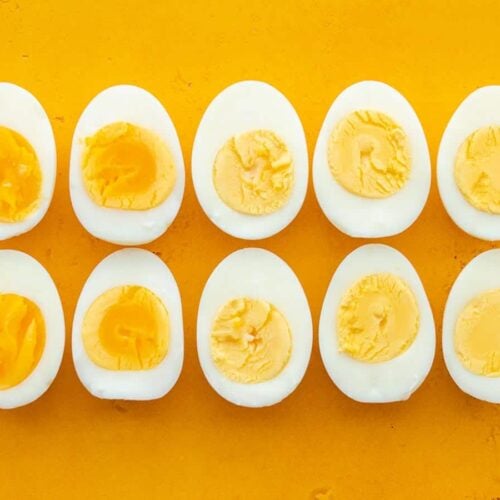
Ingredients
- 4 large eggs
Instructions
- Add cold eggs to a saucepot. Add enough water to the pot to cover the eggs by one inch.
- Place a lid on the pot and turn the heat on to high. Allow the water to come up to a boil.
- Once the water reaches a full rolling boil, turn the heat off and leave the pot on the burner (with the lid on) for about 12 minutes.*
- After 12 minutes, transfer the eggs to a bowl of ice water. Chill the eggs in the ice water for about five minutes. Peel and enjoy.
See how we calculate recipe costs here.
Notes
Nutrition
Video
More WAYS TO COOK EGGS
Looking for other ways to cook your eggs? Check out these other recipes:


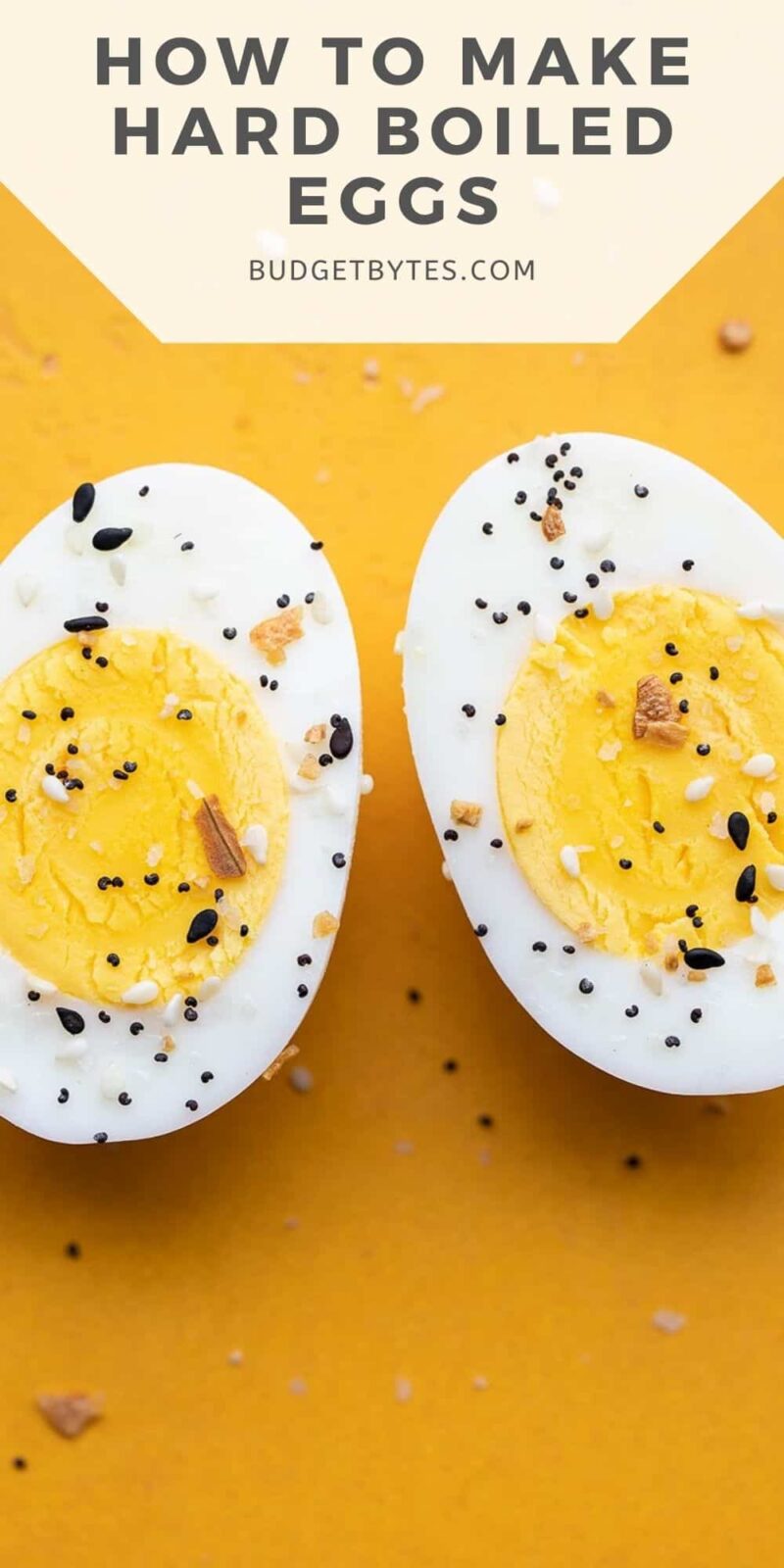
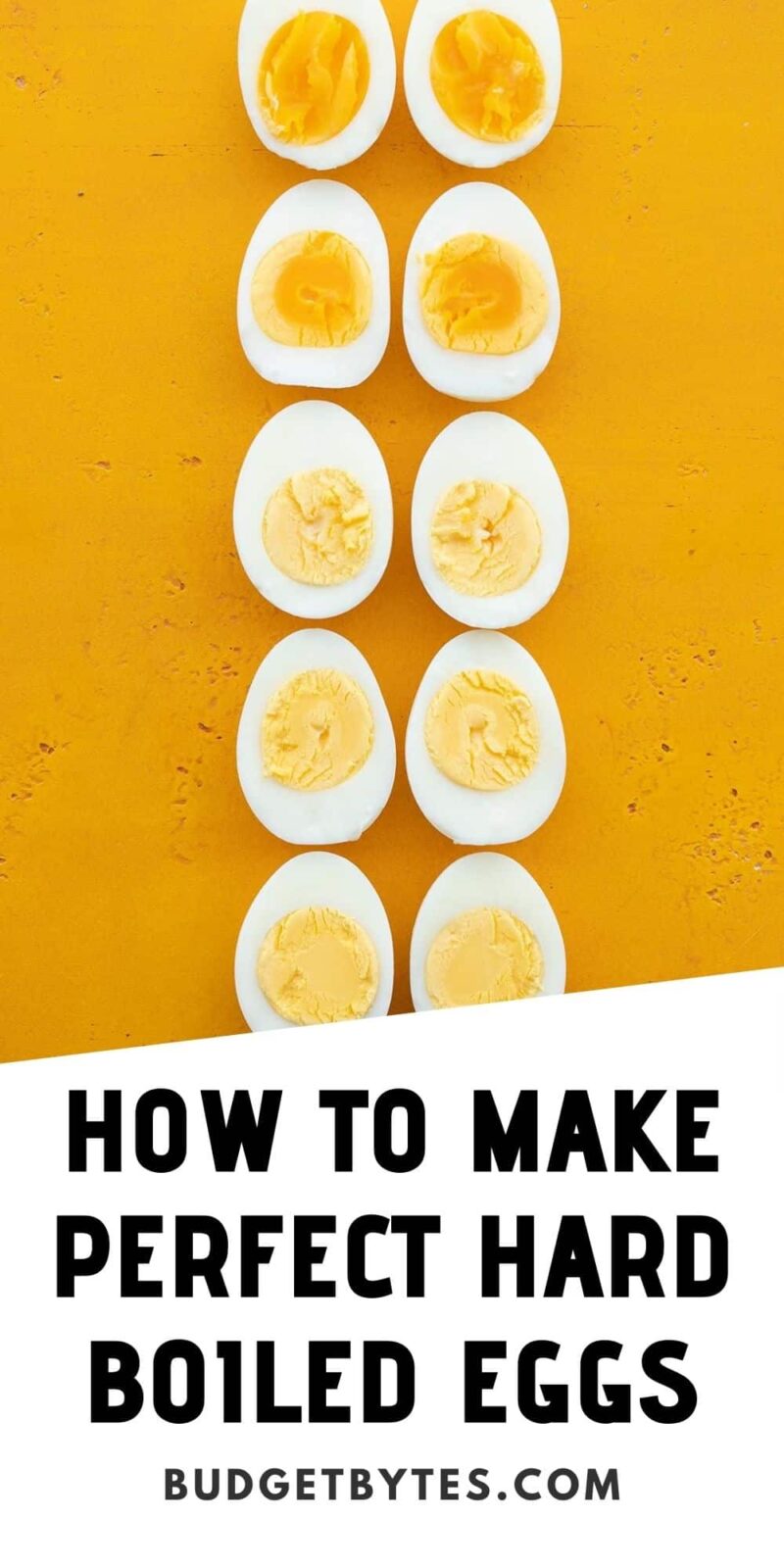
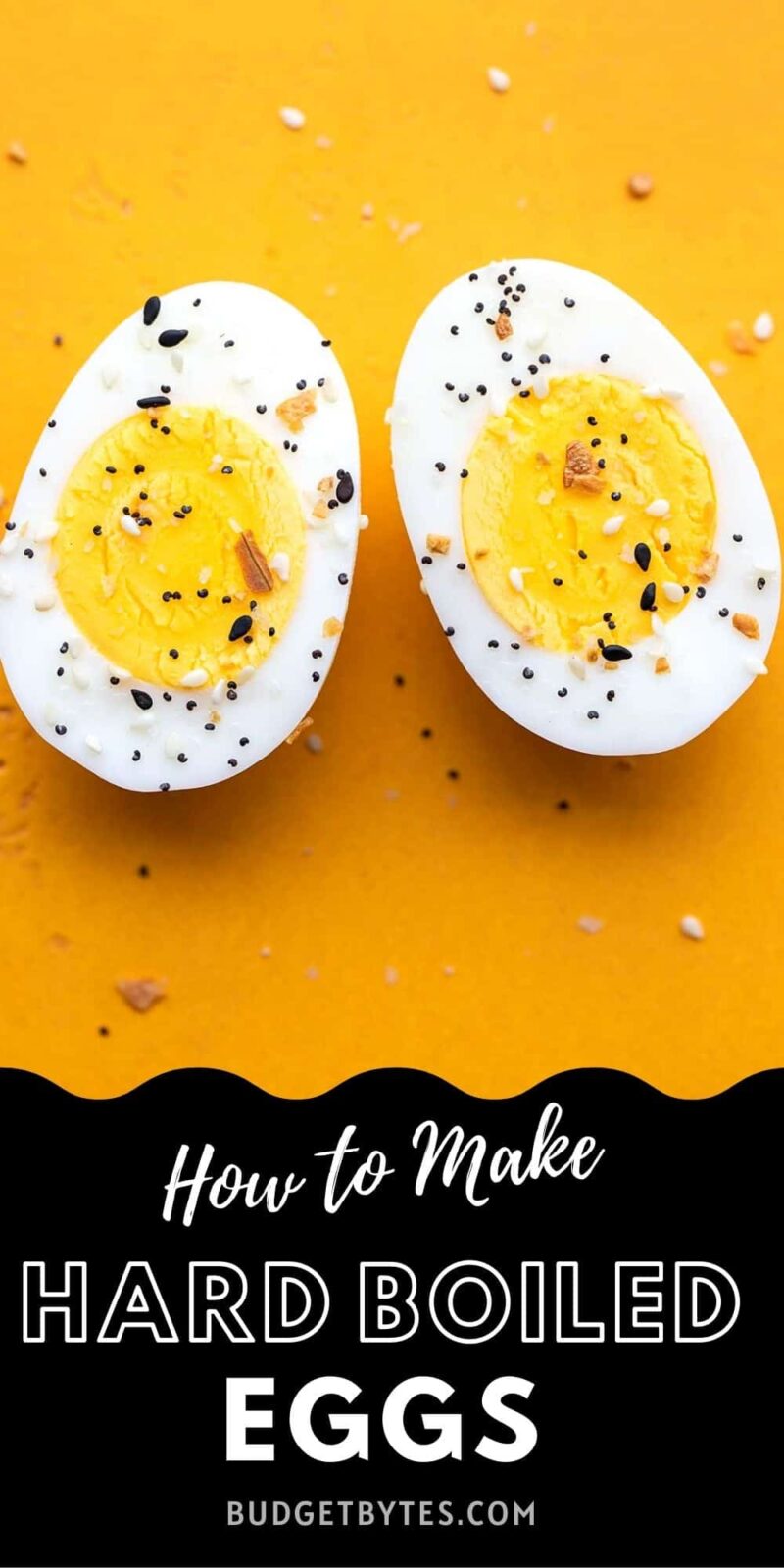
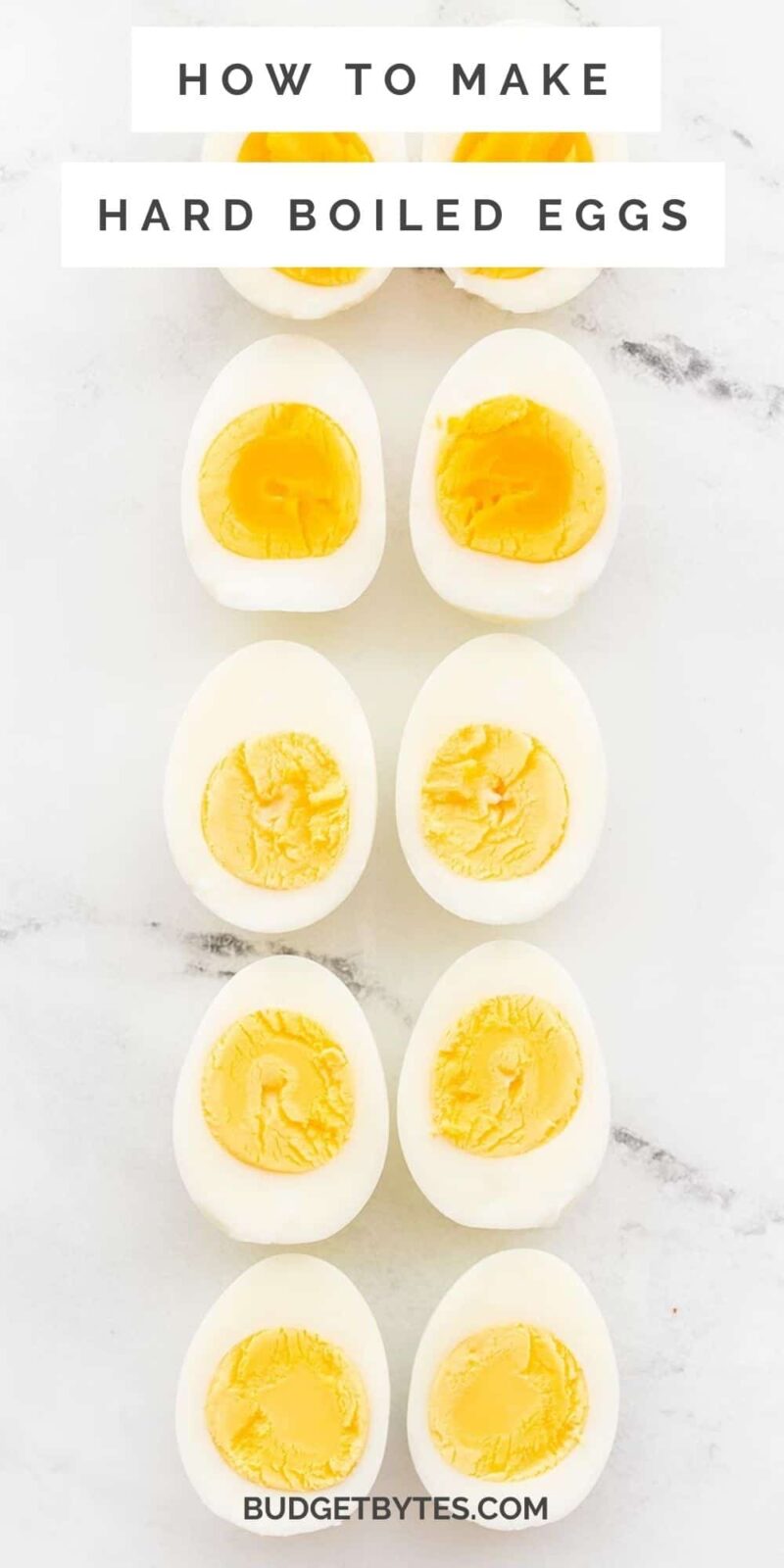
Perfect and complete instructions.
Thank you! This was the perfectly delicious boiled egg. Mine have always turned out too dry but not anymore.
I don’t even like hard boiled eggs but I was needing some extra protein in my diet. I couldn’t believe how perfect these turned out, I might change my mind now that my yolks aren’t dry, chalky and green!
Easy to follow instructions
I’ve always been hit and miss boiling eggs (rolling boil for several minutes – usually resulting in overcooked eggs). I’ve used the hot water bath method the last couple of times and the eggs came out perfect, once at around 12 minutes and once at 14 minutes (for a completely solid yolk). It really does seem to be forgiving within the last couple of minutes.
Thank you for posting “basic” how-to articles like this. My mom and grandmothers were all good cooks, but I didn’t exactly take time to learn from them when I was younger.
Hey Beth,
Your recipes are amazing and I have become a great cook now! I can feed my family and it’s a hit every time :) I actually enjoy cooking now! Thank you!!!!!!!!
Thank you!! I feel ridiculous but my husband and I could never do these right. Neither of us were taught how to cook by parents, much less boil eggs. We tried before to make hard boiled eggs using a different method and horribly failed and wasted a dozen eggs. This worked like a charm!!!!! My husband thanks you for his deviled eggs.
If water is boiled first and then eggs added, 12 minutes produces very runny eggs not hardboiled at all
Hi Lu, the instructions say to put the eggs in the water before it’s boiled so they heat up along with the water. This means that the total cook time is longer than 12 minutes. 12 minutes is just how long the eggs sit in the water after it reaches a boil.
Thanks for the instructions
12mins rolling boil?!? That’s like double the right time. Bleh
No, William, you read that incorrectly. The instructions say to turn off the heat as soon as it reaches a boil. The water stops boiling and the eggs just sit in the hot water bath for 12 minutes. ;)
Men🙄🤭 😆
I was surprised to see Ramen as an idea to add eggs to. I’ve done this since childhood only raw. I’d cook Ramen till boiling, drain most of the water amd crack an egg or 2 and mix while the egg cooks in the boiling Ramen. Comes out so good amd turns Ramen into a protein rich meal instead of just bad carbs. If you only have 5 bucks to eat than Ramen and eggs will keep you going strong. Great recipes, thanks for the helpful tips.
Brought eggs to a boil. Removed from heat. Covered pan for 6 minutes. Placed in ice bath 5 minutes. Perfection! No green. Delicious. Used duck eggs.
I add the eggs after the water boils, as you suggested in the easy peel tips. Use the same cook times you suggest. Then immediately put them in an ice water bath to cool, and I’ve NEVER had a hard to peel egg. I can almost remove the shell in 2 peices!
To peel the egg easily, peel off a tiny amount at the skinny top end, perhaps no more than a 1/4″ diameter. Softly tap the fatter end to crack the shell bottom. Put your mouth up to the skinny end and blow hard and be ready to catch the egg through the fatter end as the egg will easily come out of the shell.
Thanks